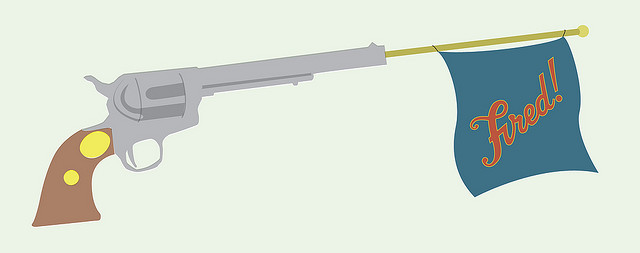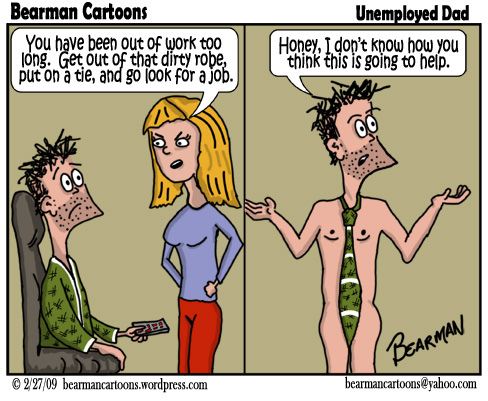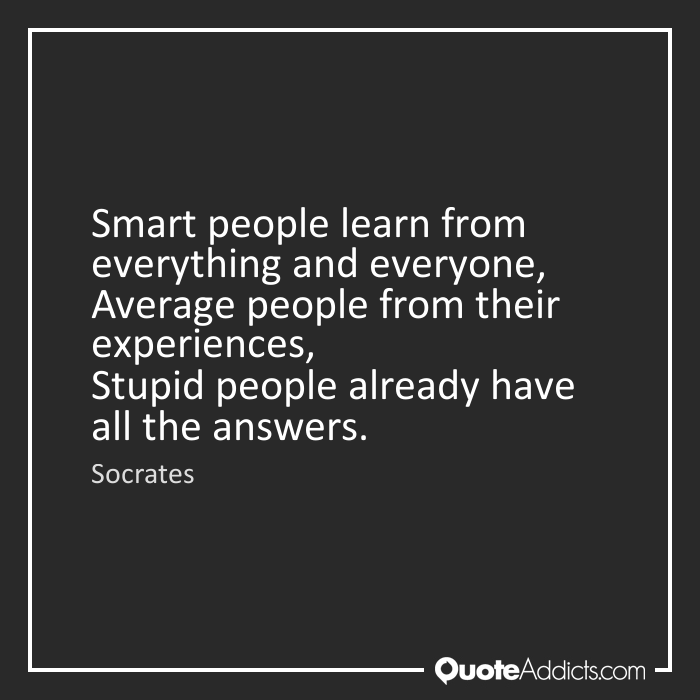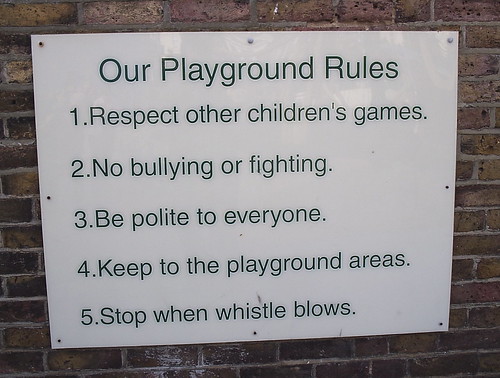how to tell when you’re working with smart people
Working with smart people pays big dividends. Here's how to tell who the smart people are.
Recently, I had an interview with a prospective client about a project they were interested in having me work on. Interviewer: “So, tell me. How do you decide what projects you like to work on?”
Me: “I like doing interesting work with smart people.”
****
I’ve been pretty lucky in my professional career. Not only have I worked for some pretty amazing companies and clients on engaging and challenging projects, I’ve also worked on some great teams. Teams comprised of people of different ages, diverse racial and ethnic backgrounds, and various areas of specialized knowledge and experience.
When I first started out as a young management consultant straight out of undergrad, I was about as green as they come. I’d done a couple of internships, but none of them prepared me for the fast pace and demanding ‘expert-at-everything’ role of a consultant working at one of the so-called ‘Big 4’ consulting firms. On my very first project, I felt like a newborn deer. Awkward, unsure of myself, wanting to ‘get it right’, but not knowing exactly what ‘getting it right’ looked like. I was in complete awe of the intellectual and professional giants on my team who’d been working in either consulting or specialized industries for decades.
Thankfully, these were friendly giants.
Instead of leaving me to sink or swim on my own, my more experienced team members met my desire and willingness to learn with an equal amount of information sharing and professional grooming. Over time, as I worked on more projects with different teams, I learned from those people as well. And within just a few years, I’d grown from a bumbling fawn to a swift-moving gazelle with my own unique blend of skills and specialties.
Since those early days of consulting, I’ve come to appreciate the immeasurable value of working alongside smart people. I’ve also come to view work as less of a job and more as 9-to-5 school, so when choosing a new role or project, it’s always important to me that the teams I’m on are people I can learn from.
Sometimes, it’s not possible to tell in advance whether the people I’ll be working with are smart. But it usually becomes pretty apparent after a few months. Here are some of the telltale signs that I’m working with a group of smart people.
They’re generous.
As I learned on my first consulting project, smart people are generous. They give freely of their time, their knowledge and accumulated information, resources, even their humor. I think it’s because smart people realize that most things are better when shared, especially if those things are being shared with someone who has just as much interest in them as they do. Smart people also seem to have a different concept of scarcity and lack. Since they’re less likely to squander their time or resources, they tend to think there’s enough of themselves and other available resources to go around.
Conversely, not-so-smart people are more likely to withhold information or time. This is often due to an underlying idea that ‘there’s not enough for everyone’ or that someone has to lose in order for them to win. On one of my projects, I heard more than one person on my team tell me that, “The way to get ahead in this company is by hoarding information.” It was a telltale sign that I was not surrounded by smart people.
They are no respecters of title.
Smart people don’t associate title or position with an individual’s degree of ‘rightness’ or worth. Smart people tend to be egalitarian in their behaviors, and they treat high-ranking colleagues with the same amount of respect as a newbie or lower-level team members. When you’re working with smart people, everyone on the team is treated as a potential expert or valued contributor. Not-so-smart people often fawn over the higher-ups in the organization, while completely ignoring or talking down to those who don’t have any significant power or status.
They’re confident, but not arrogant.
Smart people know their strengths, and they’re not shy about showing them off, especially when they see a need for their particular strengths on a project or within a team. Oftentimes, instead of waiting to be asked to put their talents to work, a smart person will confidently forge ahead with what needs to be done, without much prodding and with little fanfare. In doing so, they may even inspire others to be more confident in their own strengths. While not-so-smart people primarily seek praise and recognition for exercising their strengths, smart people are more in it for the satisfaction of a job well done.
They ask lots of questions.
Asking questions is probably how smart people got that way to begin with. Smart people aren’t afraid to raise their hands or open their mouths in front of everyone (or pull someone off to the side) to ask for an explanation, more information or clarification. Even if the question is one that others might consider dumb, tough, or challenging, smart people will ask it anyway. The question that smart people tend to ask most often: ‘Why?’
They learn from (and teach) others.
Smart people are always looking for ways to become smarter. If they see that someone is more knowledgeable or more skilled than they are, they’ll get closer to that person to learn what they know. Sometimes this is done by asking lots of questions, but many times it’s done through careful observation and adaptation.
They act on facts, not feelings.
This is not to say that smart people don’t have feelings or emotions. Rather, they’ve learned to let facts guide their actions instead of reacting to situations or people based on their current emotional state. Even if all the facts aren’t available to them, smart people will rely on previous experience and less-than-obvious clues to make an educated guess or assumption on how to proceed.
They focus on the future.
Continuous improvement, what’s next, industry innovations, what the end goal looks like – these are the things smart people focus on at work. While not-so-smart people tend to emphasize what didn’t work before or are often heard saying things like, “We’ve always done it that way,” Smart people realize that the past is only relevant if it helps determine the future vision. If what happened yesterday doesn’t help them get to where they want to go tomorrow, smart people let it go and move on.
They own up to (but don’t dwell on) their mistakes.
Smart people don’t attempt to hide their errors or mistakes. They readily own up to them and often have a plan of corrective action already thought out when they realize they’ve messed something up. But once the mistake has been acknowledged, they won’t dwell on it or beat themselves up about it. Likewise, they don’t ‘punish’ others for their mistakes. For smart people, the mistake itself is punishment enough.
They admit when they don’t know.
Wait a minute, don’t a lot of not-so-smart people say, “I don’t know” a lot? True. The difference with smart people is that they usually follow “I don’t know” with, “But…” and an action plan or approach to finding out what they don’t already know. Both smart and not-so-smart people may have gaps in knowledge; but not-so-smart people tend to be comfortable remaining ignorant, whereas smart people don’t stay ignorant or unknowing for long.
What differences have you noticed when you’ve worked with smart people? What are some ways you can tell if a person or team you’re working with is ‘smart’?
how to get more than money from your job
If you aren't asking for these work benefits in addition to a salary, you could literally be selling yourself short.
Money isn’t everything. Yet, when most of us embark on a job search, it’s the primary factor we consider in deciding whether a job is worth taking.
We typically define compensation as, ‘the money we get for working’, but another definition for the word compensation is,
something that counterbalances or makes up for an undesirable or unwelcome state of affairs.
Let’s face it. For most of us, being at work is an undesirable state of affairs. We’d certainly rather be hanging out with our friends, going for a walk in the park, taking a nap or travelling the world instead of going to work every day for years and years on end, right? So, compensation is the thing that makes up for the fact that we have to show up at a job instead of doing whatever we want. It’s the price we accept for selling our time and talents to a client or a company.
But when we only accept money as payment in this transaction, we’re forgetting about the value of other things that we’re giving up in the deal. Things that have nothing to do with money, but would do a lot to make up for the fact that you’re at work instead of snoozing under the covers.
5 Forms of Non-Monetary Compensation
Autonomy / Ownership
The ability to turn your own ideas into reality is an often-overlooked form of compensation. A job that gives you the opportunity to lead projects, come up with ideas or plans for your company or department, or just the freedom to accomplish your own work tasks in the way you see fit and without being micro-managed is much more satisfying.
Dress Code
The ability to wear what you like; not having to invest part of your salary in a totally separate wardrobe for work.
Flexible Work Schedule
Being able to structure your work day as you see fit – working on the days and times when you’re most productive. Being able to schedule your ‘real life’ into your workday.
Flexible Work Location
Being able to do your work wherever you see fit. Having the option to change work location as needed.
High-Performing or Highly Experienced Co-Workers
Working alongside super-smart or super-experienced people is like getting a free education. I owe every soft skill and business know-how I have to working with, observing and learning from people who were way better than me at what we did. Learning via traditional education does have value, but learning via association and apprenticeship is priceless.
Of course there are other forms of non-monetary job compensation like: health benefits, gym memberships, cell phone discounts and the like, but since these job ‘benefits’ are fairly standard and usually available to every employee, I feel like they’re not as valuable as the ones listed above.
Not all of these forms of non-monetary compensation will be available in every industry or for every job role. But some of them will be. And you should be sure to ask for them during the interview and selection process. If not, you could literally be selling yourself short.
And you’re worth more than that.
What other forms of work compensation would sweeten the deal for you? Have you been able to successfully negotiate any of these forms of compensation for a job?
work is play – what I learned from kickball
childhood playground lessons reveal the importance of treating work as play.
 When I get the opportunity to work with larger, corporate clients I often hesitate, even cringe. My main reason for deciding to pursue a non-traditional career was because most corporate cultures are just too dysfunctional for my tastes. Bad behavior, internal politics, and power plays are often rampant in corporate environments, and no matter how long I usually succeed in avoiding them, I eventually either get pulled into them or fed up with them. Besides, I have my health to consider. Even though corporate gigs tend to pay well and offer more perqs, what good is it if I’m increasing my stress and blood pressure in the process? In short, I’m not dying to work.
When I get the opportunity to work with larger, corporate clients I often hesitate, even cringe. My main reason for deciding to pursue a non-traditional career was because most corporate cultures are just too dysfunctional for my tastes. Bad behavior, internal politics, and power plays are often rampant in corporate environments, and no matter how long I usually succeed in avoiding them, I eventually either get pulled into them or fed up with them. Besides, I have my health to consider. Even though corporate gigs tend to pay well and offer more perqs, what good is it if I’m increasing my stress and blood pressure in the process? In short, I’m not dying to work.
Which is why I’ve (at least for now) decided to work as an independent contractor (aka, freelancer). As an independent, I’m essentially a company of one, so any dysfunction is all my own. I can deal with that. But the downside is that as a freelancer, I often work alone. In my home office. With no one else for company other than the voices in my head. As entertaining as those voices are, the truth is I like working with other people. Especially if they’re smart and talented. There’s something very motivating, inspiring, and well… fun about working on a common objective with people who have the talent and the drive to make it happen with you. I guess you could say, I like working with people who take their work seriously but don’t take themselves seriously.
That’s the basis of my primary philosophy about work: ‘work is play’.
I tend to view work very similar to the way I viewed recess in elementary and middle school. Back then, the playground game of choice for me and my classmates was kickball. We’d play every day without fail. It was less a game, and more like a recurring chapter in the ongoing daily saga of our pre-teen lives. Two people would be appointed team captains, and the captains would choose teams, making sure each team had a couple of really good kickers, a pitcher, at least 1 person with a good throwing arm, and some really, really fast runners. Once the teams were decided, the rules of play were agreed to – no bunting; you have to tag somebody out, not hit them with the ball; the foul zone was between the edge of the pavement and the monkey bars. Eventually, play would begin. Each game had its high points and low points, conflicts and petty arguments. There would be hilarious moments when something ridiculously funny would happen, and when recess ended, we’d recount the game’s highlights long after that day’s winner and loser had been decided.
Reflecting on those playground sessions has helped me realize some important facts about work and working that I consider fundamental principles of my ‘work is play’ philosophy. Namely:
The best teams have a diverse mix of people. If everyone on the team were the same type of player, it wouldn’t be much of a team. The teams that I’ve had the most fun with and learned the most from were those that were made up of people with backgrounds, cultures, and interests quite different from my own. Besides, it makes water cooler conversations a treat, to say the least.
Be clear about the rules can you live with / without. In kickball, some of the rules were standard for the game itself, others evolved as we played the game repeatedly. It’s only by playing a few games that you get a feel for which rules you prefer and which ones you absolutely have to have. I tend to prefer working in situations where the rules of play aren’t as rigid as most. Flexible work hours, casual attire, a short commute – these are some ‘rules’ I prefer, but aren’t absolute deal-breakers. But frequent travel, lack of autonomy, and weekends in the office are work rules that just don’t work for me.
It’s just a game. Play stops being fun when games are taken too seriously. The game is a part of life. It isn’t life itself. You are not a great person because you are a great kickball player, anymore than you are a great person because you are a high-level executive. The position you hold in the game is not the source of your power or strength or worth. It is the qualities and traits that you bring to the position. If and when the game ends, you will still possess the qualities and traits that make you who you are. In short, the game should neither consume nor define you.
The game can go on without you. You don’t always have to be in the game. I remember a period during middle school when, instead of playing during recess, I would sit by myself and read or write in my journal. This went on for months. Then one day, I decided I’d had enough and went back to play. Not much had changed with the game since the last time I’d played, and I returned to the daily routine as if I’d never left. It’s okay to sit out a few rounds, if you need and want to. Take time away from the game to do something for yourself, with yourself, or by yourself – especially if it’s something that will make you a better player when you return to the team. Not only can the game go on without you, but you can go on without the game.
After-game reflection is almost as important as the game itself. Conflict was an inevitable part of almost every playground kickball game. Occasionally, tempers would flare so high that there would still be tension after recess was over. Fortunately, the class immediately following recess was one in which our teacher would take time to help us work through any unresolved issues. Because our class was so small and close-knit, it was important that our relationships remained intact. Our teacher (a truly wise woman), gently forced us to reflect on our own behavior and that of our classmates, so we could grow in our understanding of each other, and ultimately go back to play another day. Taking time to reflect after every job or project is essential. It gives me the chance to assess how well I performed, what I might do differently next time, and what lessons I learned from any conflicts or issues that arose during play. After-game reflection is the #1 way to get better each time you play.
Conflict was an inevitable part of almost every playground kickball game. Occasionally, tempers would flare so high that there would still be tension after recess was over. Fortunately, the class immediately following recess was one in which our teacher would take time to help us work through any unresolved issues. Because our class was so small and close-knit, it was important that our relationships remained intact. Our teacher (a truly wise woman), gently forced us to reflect on our own behavior and that of our classmates, so we could grow in our understanding of each other, and ultimately go back to play another day. Taking time to reflect after every job or project is essential. It gives me the chance to assess how well I performed, what I might do differently next time, and what lessons I learned from any conflicts or issues that arose during play. After-game reflection is the #1 way to get better each time you play.
When I think back on those childhood kickball games, I realize that all of those playground maneuverings, all of the wins and the losses, and the occasional accidental injuries were teaching us how to work together, how to navigate relationships, and how to achieve a common goal with a group of not-so-common people. For me, work serves the same purpose – it’s the ‘playground’ where I show up to contribute my talents, to learn something, and to have fun in the process.
Once you’re able to approach your work with the mindset of play, you open up the potential for some serious learning experiences, simply by not taking everything so seriously. In work as on the playground, you have the ultimate say in what game you’re playing and what rules you play by.
cheers, k photo: At the Park by Bob B. Brown, on Flickr photo: School Playground Rules by jem, on Flickr photo:Locker Room by katerha, on Flickr
7 things to do the day after getting fired
Fired? Laid off? Newly unemployed? Here are 7 simple tips for closing out a chapter in your career like a pro.

Canned. Sacked. Let go. Forcibly retired. Getting fired, no matter what sweet-sounding name you try to pin on it, is still a pretty bitter experience. Even if you're expecting it to happen (or you've been secretly praying for it to happen), nothing ever quite prepares you for the day you get fired.
Yet, in our continually uncertain economy, getting fired is an experience that more and more people are having to deal with. Naturally, most people react to a firing in an emotional way - with tears, anger, idle threats, feelings of isolation or low self-worth. But the 24 hours after you've been fired is not the time to be paralyzed by emotion, it's the time for some very simple actions that can pay off big in the long run. You can always come back to the 5 stages of grief later.

Here are 7 suggestions for what to do the day after your last day on the job.
Tell Everyone
Though shame and embarrassment at losing your job might make you want to keep the whole mess a secret, don't. Think of it this way: if nobody knows you've been fired, nobody will know you're available for new opportunities. A quick email message (or tweet or Facebook post) to your network of friends and associates saying something like, "Guess what guys, I'm looking for employment again," followed by a very brief, very clear description of what kind of employment you'd prefer, could work wonders. Many of those people that you tell will likely reach out to ask for more details. Resist the temptation to go into a long diatribe about what an evil cad your now ex-boss was, or how you never liked that filth-flarn company anyway. There will be much time for ranting in the days to come. When pressed for more deets, simply say, "I'm not in a space where I can talk about it right now, we'll have to get together soon so I can tell you all the gory details. But if you can keep an eye out for (fabulous next job I'm looking for), I'd really appreciate it."
Ask for Recommendations
Even if you were fired for less than stellar performance, there's probably at least one person you worked with who actually liked you and the work you did. Instead of avoiding them like the plague, reach out and ask for a quick letter of recommendation. Or better yet, send them a LinkedIn request, so they can put their glowing recommendation of you on the interwebs for the whole world to see. Wait. You do have a LinkedIn account, right?
Get LinkedIn
If you don't already have a profile on LinkedIn, shame on you. I'm sure it's because you were so busy with work before that you didn't have time to get it done. Well, now that that's no longer a problem, it's the perfect time for you to create or update your LinkedIn profile. Search for and make connections with your now-former coworkers. Consider this the part of the job loss chapter that you get to write yourself. You decide which characters you want to continue in the story, and how you express what your experience was like.
Update your resume
Even if you don't intend to start looking for a new job right away, it's best to update your resume while the details of your last position and accomplishments are still fresh in your mind. You may even consider putting up a free or inexpensive website to post your skills, your resume and examples of your work.
File for unemployment
Labor and employment laws differ for every state. And if you were fired for misconduct or negligence, you may not qualify to receive unemployment benefits. But it never hurts to try. Even if you and your former employer disagree about the reason for your termination, you may be able to appeal an initial denial of unemployment benefits.
Schedule some coffee dates

Write your own training plan
Take some time to envision what sort of job or position you want next. Spend an hour or so searching on Careerbuilder, Monster and other job hunting sites for job descriptions that are similar the position you want. This will allow you to see what sort of skills or certifications are preferred for those roles, and which ones you may need to brush up on. Make a list of 2-3 classes you want to take, certifications you want to pursue, or professional skills that you want to improve upon. In the coming days (or weeks or months), your new job will be to find and complete training classes, self-directed projects, or pro-bono gigs that will prepare you for your next job.
Let's be honest, it is statistically probable that you're going to get fired at some point in your life. Your reason for being terminated may not even be your fault. And even if it is your fault, it isn't the end of the world. Life goes on. You learn from the experience, pick yourself up, and move on to the next chapter. You aren't the only one this has happened to, and you certainly won't be the last. By taking small, immediate actions you'll go a long way in dispelling the feelings of powerlessness that may come with a job loss. And by taking those actions you'll remind yourself that, in the end, you are the only one responsible for your career destiny.
cheers,
k photo 1: You're Fired! by bjornmeansbear, on Flickr
photo 2: via jericapng, on Tumblr











